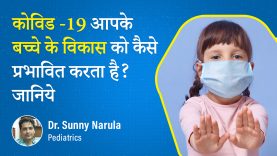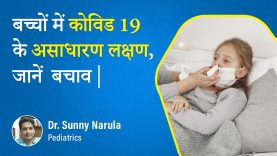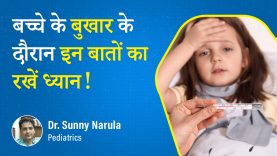Febrile Seizures Treatment | बच्चों को बुखार में आने वाले दौरे कारण लक्षण व उपचार | बच्चे को बुखार में दौरे पड़ने पर क्या करें? | बच्चों को तेज बुखार में झटके आना?
- 46.54K
- 3 years ago
Dr. Sunny Narula
Dr. Sunny Narula
Febrile Seizures Treatment, Causes, Prevention & Symptoms | बुखार में बच्चों को तेज झटके आने का क्या मतलब है? | बुखार में दौरा आने का कारण? | बच्चे के तेज बुखार में क्या करे? | फिट्स का कारण व इलाज?
Febrile Seizures Treatment, Pediatrics and expert Child specialist Dr. Sunny Narula will talk about Febrile Seizures(बुखार में आने वाले दौरे). A febrile seizure is when the child experiences convulsion along with fever. This is a common problem in children. However, it only affects children between 6 months to 5 years. There is a significant difference between normal fever and fever with convulsion. The fits triggered by fever are not so dangerous compared to the fits due to brain infection. There are more different signs of fits that are caused due to brain infections.
Fits that are caused by fever | Febrile Seizures Treatment
2% of the babies who have a fever caused by any reason can get fits. These fits are for a short duration. They usually get better on their own. There is no long-term damage to the baby due to this. And there is no lengthy treatment for this as well. The parents are often worried that this may cause any long-term damage to the baby. But as I said, it does not cause any long-term damage.
Which type of fever causes fits?
If the child has a tendency, fits can happen in any type of fever. But the higher the fever is, the more likely he will get fits.
What to do when the baby gets a seizure or a fit? /बच्चों में झटके (Fits) क्यों आते है?
- The first thing I suggest is not to panic.
- Turn the baby to one side, left or right. This is because sometimes, the babies tend to puke while having a seizure. So to avoid it from going into the lungs, the baby should be turned to one side.
- People tend to put food or water into the baby’s mouth, which should not be done.
The major complications that we see in a seizure are because the baby vomits or fed water or the spoon hits the baby. Otherwise, the fits normally go away after 2-4 mins.
If this is happening for the first time, keeping in mind these basic first-aids you must rush the baby to the hospital. Then the pediatrician would then examine the baby properly.
If the baby has fits with only fever and has no sign of brain infection, it gets better with time. But when the baby gets a fever again, there are chances of getting these seizures again. So if you take the precautions I mentioned, there would be no long-term effects.
If the baby has a fever, it has to be taken proper care of for the first few days. He can be given Paracetamol or crocin. These are the best medicines to control fever.
Do seizures run in families?
Yes, if any of the first-degree relatives, like father, mother, and siblings, had these fits, there are chances of the baby suffering from fits during fever. The other question parents are concerned about is if these fits would convert into an epileptic seizure. No, these will not lead to an epileptic seizure. Fits due to fever and epileptic seizures are two different conditions. Epileptic seizures are without fever and can happen repeatedly.
Fits during fever are common. 2 out of 100 children suffer from this. And it stops when the child gets older than five years. And no long-term medication is needed unless it is happening very frequently. Very rarely, if it happens every two months, then we treat it.
Febrile Seizure Prevention
This is a very common question asked by parents. These fits only occur with fever. The first and the second day of the fever is when the baby will experience febrile seizures. So it is very important to control the fever of the baby. Give paracetamol as required. Check the temperature, sponge the baby if the temperature is too high. Use these common methods to control the fever. The medicine used should be under medical supervision. If the paracetamol or the sponging for 10-15 mins is not helping and the temperature is not coming down, you should consult your pediatrician. Then the doctor might prescribe some other medicines, but you should only take the precautions mentioned before at home.
And the thing to remember is that there is no need to panic. There is no long-term danger to the baby’s health. And this is rare but a relatively common condition. It has no chance of converting into an epileptic seizure.















Comments (0)